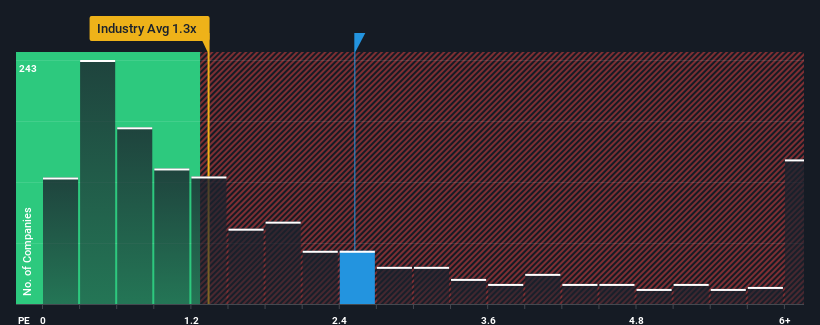- Saudi Arabia
- /
- Chemicals
- /
- SASE:2060
Getting In Cheap On National Industrialization Company (TADAWUL:2060) Is Unlikely
When close to half the companies in the Chemicals industry in Saudi Arabia have price-to-sales ratios (or "P/S") below 1.8x, you may consider National Industrialization Company (TADAWUL:2060) as a stock to potentially avoid with its 2.5x P/S ratio. Although, it's not wise to just take the P/S at face value as there may be an explanation why it's as high as it is.
See our latest analysis for National Industrialization

What Does National Industrialization's Recent Performance Look Like?
Recent times have been more advantageous for National Industrialization as its revenue hasn't fallen as much as the rest of the industry. Perhaps the market is expecting the company to continue to outperform the industry, which has propped up the P/S. If not, then existing shareholders might be a little nervous about the viability of the share price, especially if revenue continues to dissolve.
Want the full picture on analyst estimates for the company? Then our free report on National Industrialization will help you uncover what's on the horizon.How Is National Industrialization's Revenue Growth Trending?
In order to justify its P/S ratio, National Industrialization would need to produce impressive growth in excess of the industry.
Retrospectively, the last year delivered a frustrating 14% decrease to the company's top line. Even so, admirably revenue has lifted 50% in aggregate from three years ago, notwithstanding the last 12 months. Accordingly, while they would have preferred to keep the run going, shareholders would definitely welcome the medium-term rates of revenue growth.
Looking ahead now, revenue is anticipated to climb by 2.8% per annum during the coming three years according to the three analysts following the company. With the industry predicted to deliver 3.1% growth per annum, the company is positioned for a comparable revenue result.
In light of this, it's curious that National Industrialization's P/S sits above the majority of other companies. Apparently many investors in the company are more bullish than analysts indicate and aren't willing to let go of their stock right now. Although, additional gains will be difficult to achieve as this level of revenue growth is likely to weigh down the share price eventually.
The Bottom Line On National Industrialization's P/S
We'd say the price-to-sales ratio's power isn't primarily as a valuation instrument but rather to gauge current investor sentiment and future expectations.
Analysts are forecasting National Industrialization's revenues to only grow on par with the rest of the industry, which has lead to the high P/S ratio being unexpected. When we see revenue growth that just matches the industry, we don't expect elevates P/S figures to remain inflated for the long-term. A positive change is needed in order to justify the current price-to-sales ratio.
And what about other risks? Every company has them, and we've spotted 2 warning signs for National Industrialization you should know about.
It's important to make sure you look for a great company, not just the first idea you come across. So if growing profitability aligns with your idea of a great company, take a peek at this free list of interesting companies with strong recent earnings growth (and a low P/E).
Valuation is complex, but we're here to simplify it.
Discover if National Industrialization might be undervalued or overvalued with our detailed analysis, featuring fair value estimates, potential risks, dividends, insider trades, and its financial condition.
Access Free AnalysisHave feedback on this article? Concerned about the content? Get in touch with us directly. Alternatively, email editorial-team (at) simplywallst.com.
This article by Simply Wall St is general in nature. We provide commentary based on historical data and analyst forecasts only using an unbiased methodology and our articles are not intended to be financial advice. It does not constitute a recommendation to buy or sell any stock, and does not take account of your objectives, or your financial situation. We aim to bring you long-term focused analysis driven by fundamental data. Note that our analysis may not factor in the latest price-sensitive company announcements or qualitative material. Simply Wall St has no position in any stocks mentioned.
About SASE:2060
National Industrialization
Operates in the petrochemicals, chemicals, plastics, and metals sectors in the Kingdom of Saudi Arabia, rest of the Middle East, Asia, Africa, Europe, and internationally.
Good value with proven track record.
Similar Companies
Market Insights
Community Narratives




